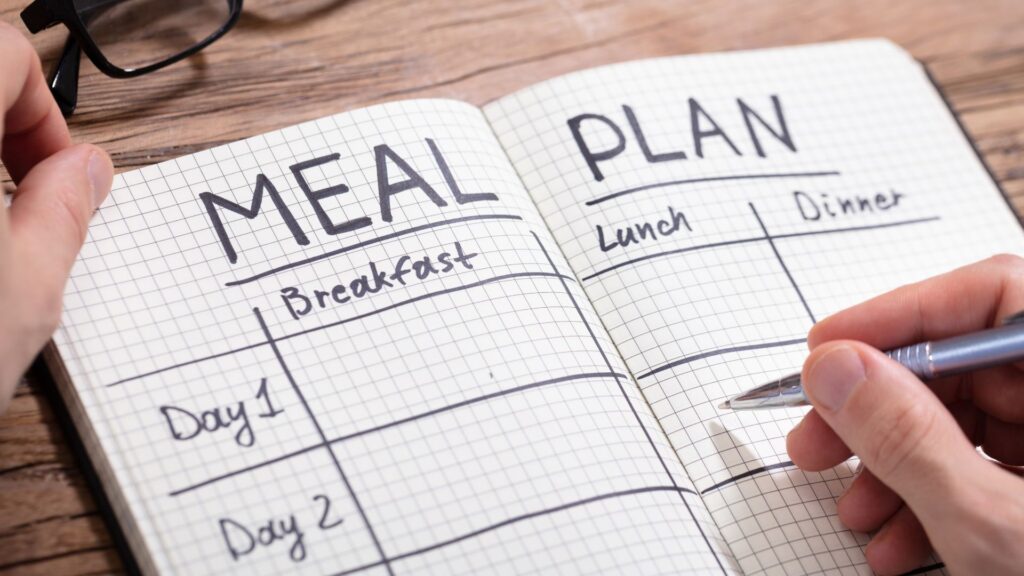A bowl of savory butternut squash soup with sage. A zesty tabouli wrapped in Romaine. An arugula salad topped with artichokes, avocado, golden beets, and sunflower seeds. The richly delicious array of foods that we have to choose from is simply dazzling!
At the same time, do you ever find yourself weighing the options, unsure of which cuisine to choose? Or perhaps you’re trying so hard to keep up with the demands of the day that you simply grab whatever is easiest and struggle to remember the details of your meals by the end of the day.
A simple remedy: Log your food intake! If you’ve ever looked at a flight tracker on a long flight, you’re familiar with the visual picture it provides of where you are as you travel. A food tracker is similar. It gives you a chance to track where you and your appetite travel throughout the day. It’s essentially like keeping a journal—but streamlined to focus entirely on your journey…with food!
Whether you are interested in weight management or have a diagnosed health condition, tracking your food can be a game-changer.
Inspiring Research
According to a 2023 study by the University of Connecticut, consistency in tracking food intake is a key component in supporting healthy weight loss.
Assistant Professor in the Department of Allied Health Sciences at the University of Connecticut Ran Xu explains, “It turns out, you don’t need to track 100% each day to be successful. Specifically in this trial, we find that people only need to track around 30% of the days to lose more than 3% weight and 40% of the days to lose more than 5% weight, or almost 70% of days to lose more than 10% weight. The key point here is that you don’t need to track every day to lose a clinically significant amount of weight.”
Department of Allied Health Sciences Professor at the University of Connecticut Sherry Pagoto adds, “A lot of times people feel like they need to lose 50 pounds to get healthier, but actually we start to see changes in things like blood pressure, lipids, cardiovascular disease risk, and diabetes risk when people lose about 5-to-10% of their weight. That can be accomplished if participants lose about one to two pounds a week, which is considered a healthy pace of weight loss.”
Log Your Food with Ease
Food tracking isn’t just about losing weight; it’s also about cultivating improved nutrition and raising your awareness about your relationship with food.
We’ve prepared seven handy tips to help you track your eating habits with low levels of stress and high levels of success!
- Plan for Success
🌎 Each of us has different goals. Decide what’s most important to you to track based on what you hope to learn about your eating habits. Choose a level of detail that’s right for you.
🥕Would you like to count calories, or do you prefer to track ingredients, or how many servings you have in specific categories, such as Vegetables, Fruits, Grains, etc.? Set up a simple chart with spaces for entries in Early Morning, Morning, Noon, Early Afternoon, and Evening. That way you can track not only what you’re eating but also when! If you’d like, start with the food tracker provided by the CDC.
⚠️If you’re dealing with an eating disorder or have a history of an eating disorder, it’s recommended to forego tracking your food and instead reach out to your healthcare providers, including physicians, nutritionists, counselors, and therapists, for support.
- Keep It Convenient
🍴Keeping your log where you will see it often, ideally at the kitchen table or wherever you eat, will increase the chances that you’ll remember to log your meals. Consistency is key!
📱If you’re on the go a lot, you might prefer logging your foods digitally. Side note: the Innergy app has a great journaling tool that’s easy to use!
🥗If you’re in a rush or are dining out with a group, simply snap a photo of your meal to refer to later in the day when you have easy access to your log.
- Personalize
😊 Eating is often about much more than the food, right? It can be both fun and helpful to include a few columns in your food log to note where you ate, and with whom—along with your mood. If you like, you can use a simple method like smiley faces or emojis to track your moods. This can help in establishing connections between mood and food—and noticing any emotional eating that may be taking place.
- Track Your Symptoms
⚕️Unless we’re paying close attention, it’s easy to miss valuable cues about what may be causing, aggravating, or mitigating certain symptoms. Begin to notice when you experience an increase or decrease in chronic conditions. After a meal, jot down any physical reaction you may have had, such as a headache, stomach ache, or fatigue. To keep it simple, consider listing your common symptoms and enter a number 1 to 10 to note the severity. That way, over time, you check for any patterns or trends.
- Stay Current
🤔 It’s surprising how challenging it can be to remember the details of what we’ve eaten. Give it a try: Name everything you ate yesterday. Then, do the same for two days ago. Was that when you had a bagel and fruit for breakfast? Or was that when you started the day with a smoothie?
✍️ Logging your food after each meal is ideal to keep the process both accurate and stress-free!
- Log Your Water Intake, Too!
💦 While it can be difficult to know offhand how many ounces of water we drink each day, getting in the habit of logging each glass you drink can give you a good idea. Keep it simple. For instance, you can make a checkmark in your log after each glass!
- Be Compassionate
💟 If you are struggling to gain or lose weight or find yourself worrying obsessively about your food intake, remember to be as kind and compassionate with yourself as you’d be with a close friend. Do your best, and take it one step at a time. Consider reaching out to a nutritionist or a counselor for support if your stress levels about food are high.
Putting Your Plan to Work
Pause every week or month to look back at your entries and see what you discover. Think of your food log as a magic key that can unlock the door to transformational knowledge!
Taking just a few minutes to enter data after each meal or snack can pay big dividends by shedding light on your eating habits and trends, empowering you to boost your overall wellbeing by making healthy choices moving forward.
While the daily process of eating can cause us to slip into autopilot in our relationships with food, eating truly is one of the most vital acts in shaping the health of our body and mind!
As the ancient Greek physician Hippocrates, who is often called the father of modern medicine, said, “Our food should be our medicine, and our medicine should be our food.” With this in mind, let every bite of each meal nourish you and take you closer to a future of vibrant health, harmony, and wellbeing!






